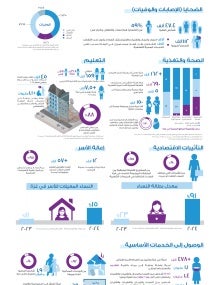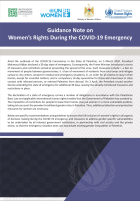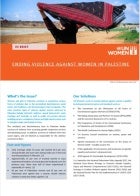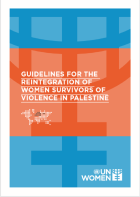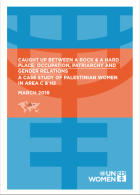1 - 20 of 21 Results
Pagination
Date:
The war on Gaza has become one of the world’s most brutal man-made humanitarian crises. The war has directly impacted more than 2.2 million people, resulting in an unprecedented number of civilians killed, alongside overwhelming displacement. Since 7 October 2023, more than 36,000 Palestinians have been killed by Israeli forces in Gaza, including at least 10,000 women, and an estimated 82,000 people have been injured.
Date:
Clinical Management of Rape in the State of Palestine in the Framework of COVID-19
Date:
This brief suggests that domestic violence has increased in Palestine due to the conditions created by the COVID 19 pandemic, which in most cases resulted in a lockdown of survivors of violence with their abusers. With families in lockdown, helplines are seeing a surge of cases requesting a multitude of services.
Date:
This brief highlights emerging evidence of the impact of COVID-19 crisis on the access of women victims and survivors of violence to justice and security services in Palestine. It makes recommendations to be considered by all sectors of society, from governments to international organizations and to civil society organizations, in order to ensure that perpetrators of violence against women are held accountable, and victims’ right to protection, remedy and reparation are maintained.
Date:
This guidance note ensures the full inclusion of women’s rights in all aspects of decision-making during the COVID-19 emergency and addresses gender-specific vulnerabilities to be undertaken by all relevant government institutions, in partnership with civil society and the private sector, so that the emergency situation does not exacerbate existing gender inequalities in Palestine.
Date:
Across every sphere, from health to the economy, security to social protection, the impacts of COVID-19 are exacerbated for women and girls simply by virtue of their sex. This policy brief explores how women and girls’ lives are changing in the face of COVID-19, and outlines suggested priority measures to accompany both the immediate response and longer-term recovery efforts.
Date:
This brief highlights emerging evidence of the impact of the recent global pandemic of COVID-19 on violence against women and girls. It makes recommendations to be considered by all sectors of society, from governments to international organizations and to civil society organizations, in order to prevent and respond to violence against women and girls, at the onset, during, and after the public health crisis, with examples of actions already taken.
Date:
A two-page fact sheet providing an overview of UN Women Palestine office's “Ending Violence against Women in Palestine”.
Date:
In the oPt and around the world, there is an increasing recognition amongst humanitarian actors of the urgency to ensure that the different needs of women, girls, men and boys are taken into account and included in all humanitarian assistance (design, planning, implementation and monitoring). Failure to do so hampers an effective humanitarian response and may put beneficiaries’ lives at risk1. According to IASC Gender Handbook for Humanitarian Action2, integrating gender equality also reinforces a human rights-based approach to humanitarian action which improves programming by respecting and protecting the universally recognized rights and dignities of every individual as a human being. Incorporating gender equality in humanitarian action therefore enhances the impact of humanitarian strategies and interventions.
Date:
This document is an assessment of ‘Protection, Response and Preparedness to Address Needs of Displaced and Vulnerable Women in Gaza', funded by Japan. The findings of the assessment are that the Cash for Work intervention was assessed to be highly relevant and to have achieved its objectives. The women beneficiaries clearly appreciated the cash for work opportunities, the elevated social status they gained, the level of autonomy and the additional freedom to make their own decisions regarding household expenditure.
Date:
This manual, which is closely associated with the Palestinian Referral System, is an illustrative and guiding tool for staff and workers to lead the reintegration process of women and girls victims/survivors back into the community. The roles and duties of the different partners are based on the referral mechanisms adopted in the Referral System document. Therefore, the Palestinian Referral System is an essential document complement to the reintegration guidelines.
Date:
This report is an in-depth, gender-based study designed to identify - and help voice - the needs and priorities of women living in areas under occupation and facing prolonged humanitarian crisis. The findings, conclusions and recommendations of the report are addressed to humanitarian, as well as development and political, actors to enable them to develop an informed humanitarian response that addresses the gender-differentiated impact of the Israeli Occupation on community members in general and women in particular.
Date:
The International Men and Gender Equality Survey (IMAGES) in the MENA region has been designed and conducted to help fill the knowledge gap in research on men’s attitudes and practices in terms of their partner relationships and their perspectives on gender equality in four Arab States, Egypt, Lebanon, Morocco, and Palestine.
Date:
UN Women in cooperation with humanitarian sectors and clusters has developed a collection of women’s stories under blockade in Gaza. The stories aim to give a voice to women in Gaza who suffer the consequences of violence, poverty and limited access to services.
Date:
The effectiveness of existing GBV interventions, as well as their problems and gaps cannot be addressed without understanding the Gaza context.This report is a first attempt to assess the achievements, continuing obstacles and gaps among the community of NGO providers in Gaza.
Date:
Since 2013, UN Women and the Attorney General Office have been working together to strengthen investigation and litigation of violence against women cases.
Date:
Seminar report of the international seminar on Gender Based Violence (GBV) in the Gaza Strip held in September 2016.
Date:
The impact story offers a quick glance at UN Women's intervention strategy and impact on women and children victims and survivors of violence when addressing the police for protection and justice.
Date:
Where are women? Where is women's accessibility to "justice"? Are there possibilities for justice in the context of military occupation. The report delves into the spatio-temporal, socio-legal, political and economic factors and ideologies to uncover hidden abuses and analyze policies and practices that hinder women's ability to access the prevailing legal systems in the West Bank and enjoy their rights to a secure and dignified life.
Date:
One of the first comprehensive report on the situation of Palestinian women, the report explores the status of Palestinian Women in 8 sector areas - Health, Education, Social services, labor and employment, women and assets, access to justice, political participation and access to the public sphere - from key trends and challenges to strategic opportunities and policies priorities.
